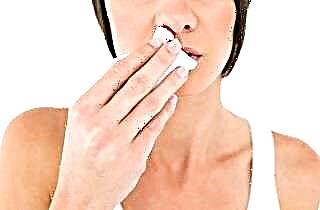Coughing is a normal reflex reaction of the body to stimuli. It can be wet productive or dry non-productive. A dry, deep cough is usually caused by infectious, allergic and viral pathogens. It is dangerous for the body, as it irritates the mucous membrane and accompanies most of the inflammatory processes in the respiratory organs.
Causes and types
 Frequent dry cough is a symptom that accompanies more than 50 diseases. In this case, we are talking about both a banal seasonal cold and more serious ailments, for example, tuberculosis or lung cancer. Depending on the duration, the cough is divided into the following types:
Frequent dry cough is a symptom that accompanies more than 50 diseases. In this case, we are talking about both a banal seasonal cold and more serious ailments, for example, tuberculosis or lung cancer. Depending on the duration, the cough is divided into the following types:
- Spicy. It lasts no more than two days, then it transforms into moist bronchospasm and gradually stops.
- Protracted. He can torment the patient from three weeks to three months.
- Chronic. This cough without phlegm usually lasts more than three months.
As mentioned above, a dry cough can be a frequent companion of a large number of ailments. But most often it is caused by the following reasons:
- A severe dry cough in an adult or child can be initiated by many factors that are pathological and non-pathological in nature. For example, a dry, painful cough is sometimes a symptom of inflammation of the larynx (laryngitis). Cough attacks are especially acute at night. Often this symptom is complicated by a false croup. In this case, urgent medical attention is required, otherwise you can get respiratory failure.
- A painful dry cough is also diagnosed with inflammation of the trachea or bronchi. The attacks disturb the patient for no more than 3 days. After that, bronchospasm is transformed into a productive wet form with abundant sputum secretion.
- If the throat does not hurt, but a severe cough is still present, inhalation of strong-smelling substances or volatile chemicals may be the cause. Often this is observed among workers in hazardous industries. In this case, doctors are talking about a professional cough. In addition, a throat-tearing cough attack accompanies tobacco lovers.
- Pleurisy (inflammation of the pleural sheets) is another possible cause of severe, prolonged and painful coughing attacks. Such an ailment immobilizes the patient. The slightest movement or change of position leads to intense pain in the chest area. A dry, tearing cough is not the only companion of pleurisy. It is complemented by other symptoms - shortness of breath, high fever, chills and general weakness.
 A very bad cough is often due to whooping cough. This disease most often affects children, but adults are not immune from it either. Cough attacks usually end in vomiting. A characteristic feature of the disease is the immunity of cough to traditional antitussive drugs.
A very bad cough is often due to whooping cough. This disease most often affects children, but adults are not immune from it either. Cough attacks usually end in vomiting. A characteristic feature of the disease is the immunity of cough to traditional antitussive drugs.- Dry cough and sore throat can accompany bronchial asthma. We are talking about a chronic pathology of the respiratory system, which is characterized by painful and often repeated attacks. This is a dangerous disease, as it can lead to death if the drug is not administered to the patient in a timely manner.
- A great danger is fraught with cough attacks, the cause of which is tuberculosis. This disease leads to numerous complications and requires immediate treatment. It is impossible to get rid of the disease without professional medical help.
Treatment
If you or your loved ones are tortured by a dry cough, you need to start therapeutic measures. Do not self-medicate or pick up medications by reading reviews on the Internet or listening to advice from friends. Improper treatment is fraught with many complications. The main task in this case is to convert a dry, unproductive cough into a wet, productive cough and form phlegm.
 To stop coughing, take a holistic approach to therapy.
To stop coughing, take a holistic approach to therapy.
Medicines must be combined with physiotherapy, as well as means from the arsenal of traditional medicine. It should be remembered that the choice of specific medications will depend entirely on the underlying cause of the cough. In most cases, a dry cough in the morning and throughout the day is caused by colds. Therefore, the rehabilitation course will look like this:
- antiviral medications.
- antibiotics (only if urgently needed);
- mucolytics ("ACC", "Lazolvan" and so on);
- antihistamines (for allergic coughs);
- antitussives to block the cough center.
It is always worth remembering that antitussive drugs are prescribed only in individual cases, for example, in the treatment of whooping cough (and only as directed by a doctor). You cannot use them without the instruction of a specialist, and there is a very good reason for that.
In the process of treating tracheitis, bronchitis and other pathologies with acute inflammation of the upper respiratory tract, it is necessary to remove phlegm from the body. Antitussive medicines block coughing up. Therefore, the mucus sinks lower - into the lungs and leads to dangerous complications.
Physiotherapy
Dry cough in adults and children can and should be treated with physiotherapy. The role of such procedures cannot be overemphasized. In combination with drug treatment, they help to increase immunity and bring the moment of recovery closer. If you have a dry cough, use the advances in modern physiotherapy. They will help improve blood circulation, significantly reduce the intensity of pain and reduce inflammation.
 A dry cough and pain will stop holding you hostage if you use the following physiotherapy methods:
A dry cough and pain will stop holding you hostage if you use the following physiotherapy methods:
- UHF therapy;
- electrophoresis;
- hardware warming up;
- inhalation;
- acupuncture;
- massage of the chest area;
- restorative breathing exercises and so on.
Are you suffering from a dry type cough? Try an innovative method of physiotherapy - inhalation through nebulizers. This is a portable ultrasonic compressor device that transports drug particles directly to the lungs or bronchi. As a result, the rehabilitation process is twice as fast and easier for the patient.
Also, do not forget about the effective preventive effect of nebulizers on the body. Inhalation using such a device reliably protects against bronchial spasms and obstructive bronchitis. In addition, they protect young children from various complications, including false croup.
Folk remedies
Now we know what a dry cough is dangerous, and it's time to apply another component from our treatment complex. Traditional medicine is a source of wisdom and knowledge passed down from generation to generation. But do not use folk recipes as a key element of therapy. They will only be effective when paired with traditional medication. Otherwise, at best, folk remedies will be useless, at worst, they will transform the cough into a chronic form.
 To eliminate dry throat and coughing attacks, and quickly form phlegm, use the following methods:
To eliminate dry throat and coughing attacks, and quickly form phlegm, use the following methods:
- For coughing attacks, consume plenty of liquid in the form of purified water, compotes, teas, herbal decoctions, and so on.
- Drink hot milk with a pinch of baking soda and a teaspoon of honey.
- Do not forget about compresses, mustard plasters and rubbing.Naturally, not everyone is delighted with these procedures (especially small children). But it is these methods that help reduce the intensity of the cough and speed up the healing process.
- Use traditional potato or baking soda steam inhalers.
- Drink black radish juice with honey (or sugar).
- Treat with a mixture of lemon juice, honey and glycerin.
A few words about diet and prevention
What is the correct diet for dry cough, and what foods must be included in the diet? We recommend using milk-cooked oatmeal. In addition, pay attention to mashed potatoes (again in milk), grated radish salads with vegetable oil or sour cream. Those who often drink coffee should give it up for a while. Eat a barley drink with milk and chicory.
A strong, dry cough during the day should be a reason to avoid excessive consumption of very sweet, salty, sour or spicy foods. All of them negatively affect the state of the mucous membrane and contribute to its irritation. Fasting should not be practiced. There is no need to weaken an already exhausted body (this also applies to cases of severe coughing with vomiting).
 Separately, it must be said about preventive measures. The following simple tips will help you not get sick and always feel in good shape:
Separately, it must be said about preventive measures. The following simple tips will help you not get sick and always feel in good shape:
- do not overcool;
- eat balanced;
- walk in the fresh air;
- start to harden the body (contrast shower to help);
- undergo a fluorographic examination annually;
- do not let the course of a cold take its course (treat yourself on time and consult a doctor);
- in hazardous work, protect the respiratory system with a respirator.
Once again, I would like to note the danger of self-medication. Even if a mild cough bothers only during the day, you can not refuse to visit the doctor.
Bronchospasm may lacerate the throat at night, be present for a day or two. Regardless of the causes of cough attacks and their characteristics, always seek professional help.

 A very bad cough is often due to whooping cough. This disease most often affects children, but adults are not immune from it either. Cough attacks usually end in vomiting. A characteristic feature of the disease is the immunity of cough to traditional antitussive drugs.
A very bad cough is often due to whooping cough. This disease most often affects children, but adults are not immune from it either. Cough attacks usually end in vomiting. A characteristic feature of the disease is the immunity of cough to traditional antitussive drugs.

